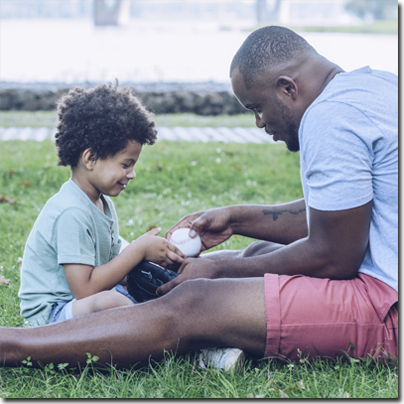 For weeks my children begged and pleaded to start karate. I finally caved in and signed them up for classes.
For weeks my children begged and pleaded to start karate. I finally caved in and signed them up for classes.
On the first day, the five-year-old stayed glued to my left leg for the entire 45-minute class, while the seven-year-old sunk to the back corner of his class and barely participated.
We went on this way for a WEEK!
They started asking to discontinue the karate classes, but I’d already paid for the first month.
I continued to take them.
And then slowly but surely, they started drifting to the middle of the class. They started remembering the moves and yelling their “HI-YAH” s along with everybody else.
Now they look forward to their classes and practice everywhere they go!
As parents, encouraging our children to have the courage to embrace their interests and helping them to try out new things they aren’t good at yet, isn’t always an easy task.
It is something we ALL have to do at some point or another, though.
It is a crucial step in helping our kids get comfortable in their own skin and having the fortitude to get past uncomfortable situations.
Here are a few other ways to raise kids who are comfortable in their own skin:
Encourage Them
 On their journey to self-discovery and learning to be comfortable in their own skin, our children actively seek our acceptance and validation.
On their journey to self-discovery and learning to be comfortable in their own skin, our children actively seek our acceptance and validation.
So, it is important that we encourage their passions and always let them know that their feelings and emotions matter and they aren’t less important just because they’re children.
Dr. Melanie Fernandez from the Child Mind Institute suggests that one of the more effective ways to ‘praise our children to encourage good behaviors and improve self-esteem’ include being more specific and descriptive when giving them encouragement.
She states:
“The more descriptive your praise is, the better. So instead of saying, “Good job!” caregivers should specify what was a good job. For instance, “Good job sharing your toys with your brother!” When you’re specific about what a child did well, you’re more likely to bring attention to the child’s effort-as opposed to the outcome of the effort.”
And in encouraging them, and doing so effectively, we hope to show them that as parents we embrace them for who they are and give them the freedom and security to feel comfortable being themselves.
Be Comfortable Yourself
 You should allow your child to hear you say positive things about yourself.
You should allow your child to hear you say positive things about yourself.
Growing up I wanted to be just like my mother. I followed so closely behind her; you would think I was her shadow!
And if she was in the mirror, you had better believe I was right there beside her copying her every move. She would use words I didn’t understand at the time, and I would repeat them all the same.
Imagine my surprise when I finally found out all the unkind things she said about herself.
You would be surprised by the things your children learn from you; they are always watching.
If you want to raise children who are comfortable in their own skin, then you should also be comfortable in your skin and with who you are.
Be mindful of body shaming language and try not to use it. Tell your children how strong their body is, bring attention to it, and have them acknowledge it.
More importantly, tell them that it’s okay to be a little different than others, and that being an individual is something to be celebrated!
Often being well-mannered and well-liked require our children to conform to societal norms. They need to hear, watch and learn from you that it is okay to be themselves.
If you are comfortable in your skin, they will be too.
Or, as an author of one of my favorite articles put it:
“Eventually, our son would know us better than we knew ourselves. And somehow, that was a comforting thought, that parenting was not something we could purposefully decide, that it was who we were and how we lived that would inevitably constitute the family environment that would shape our child.”
Let Them Take Chances!
A big part of discovering who you are is learning to trust yourself to overcome perceived limitations.
Whether it’s a new sport or hobby, we should always urge our children to try new things!
Before karate, my children were enrolled in baseball.
They liked their uniforms, and they liked seeing most of their friends, but they admitted that it wasn’t as much fun as they thought it would be.
When they decided to make a switch to karate, they were apprehensive.
Mostly, they were afraid that their friends would think that they didn’t want to play with them anymore.
I could see how heavily the possibility of upsetting their teammates weighed on their conscience.
I encouraged them to do it anyway!
As parents, a big part of raising children to be comfortable in their own skin is to teach them to take a chance and to follow their own dreams and passions.
Even if, and especially when, their interests go against the popular opinion.
Since switching sports, they do seem happier!
And they’ve made new friends and have been surprised by some old friends in their classes.
But none of it would have been possible if they didn’t take a chance.
Talk to Them
 Have a conversation, not a lecture. Find out what they are thinking. Be interested in their opinions.
Have a conversation, not a lecture. Find out what they are thinking. Be interested in their opinions.
For our children to be fully engaged with us, they need to know that they have a voice.
And they must feel that what they have to say matters to us.
We have a lot vested in them, and it is easy to get emotional. Try to avoid talking at them, and instead talk with them.
Keeping the lines of communication open can prove to be a real challenge at times. It takes real effort and introspection, and is one of the areas of the relationship that parents must take the lead in.
One strategy shared by Dr. Laura Markham that I’ve found that works for me and my children is in her words to:
“LISTEN. This is, of course, the single most important part of helping kids open up. Don’t talk, listen. Reflect what they’re saying so they know you understand, and then be quiet so they can talk more. If they don’t keep talking, you can ask another question, but keep your tone companionable, not interrogatory.”
To raise children who are comfortable in their own skin, our children need to feel supported.
To be in a place to be able to offer that support, we as parents must earn the trust of our children. And to earn that trust, we have to listen to our children.
Try New Things Together
 Raising children who are comfortable in their own skin requires them to get out of their comfort zones.
Raising children who are comfortable in their own skin requires them to get out of their comfort zones.
So, watch for opportunities that they are interested in and might enjoy being challenged to learn and grow beyond their comfort zones. And do them together.
Introduce them to different things. Broaden their horizons about what it means to be, or to learn and be smart. Show them that they can be smart in different ways.
Volunteer or visit museums that have hands-on exhibits so that they can engage with what they’re exploring.
Join a 5K run. Volunteer at the local food bank. Participate in community events.
Anything at the intersection of your interest and theirs is fair game.
Children need to interact with the real world to genuinely feel they can make a positive impact on the lives of others.
Don’t know where to start? Here are a few ideas to get you started.
They need to be comfortable with the idea that they can try new things, and know that even if it is uncomfortable in the beginning, it will all work out and they’ll be okay!
The 2-Minute Action Plan for Fine Parents
Raising a child who is comfortable in their own skin requires both parent and child to put themselves in uncomfortable situations at times. This can bring about feelings of discomfort or anxiety. So for our quick contemplation questions today, ask yourself:
- How do I normally offer my support in a situation that is new to my kids?
- Is what I am doing helping them feel more comfortable in their skin, or is it making them doubt themselves more? If it is the latter, what can I do differently?
- What lessons have I learned from my children?
- Am I positively involved with my children?
- How can I continue to keep growing in this area?
The Ongoing Action Plan for Fine Parents
Sometimes as parents we worry when there is no need to. Often our children are more outgoing than we dare to be. Let them take chances! Assure them that if things don’t work out the way they wanted them to, it’ll still be okay. Show them that they have your understanding, and your unconditional love and support. Show them that you appreciate them for who they are.
Hi, I’ll come right out and say I’m with parents on this, be comfortable in the skin you were born in. You know where this is going.
How do you show these child mutilators that kids need to be comfortable in their own skin, not surgically change who they are to be okay?
Maybe your opinion is that of the child predators though, in which case. Why? I just a whole article about how kids are born perfect as they are.
There might be follow up questions, but I promise I’m not looking for a fight, just trying to navigate the hell scapes that are today.
Absolutely. You are so right about it starting with being there and being involved in a positive way to reassure them. You are also right about letting them take risks and sometimes I need to do that a bit more! I do encourage a growth mindset to help them know it is ok when they fail though.
Definitely! Acceptance is very important as our children grow and develop. And coping with let-downs and disappointment when things don’t go the way we may have wanted them to, these are very strong tools that will only help them as they grow!
I am a grandmother that cares for my granddaughter every weekday. She often refuses to go to new places or try new things. For example, this week it snowed and she stated as she was falling asleep that she did not want to go sledding. I said OK and she fell asleep. She did do a little bit of sledding last year. I have not challenged her on these issues……. When she gets comfortable with new things then she will do them on her own. How should I handle this?
Perhaps start with activities that she already likes, and expand from there. She may not be a fan of the outdoors, but she might like indoor activities. Find out what they are, spend some time engaging in them with her, and you’ll find that she’ll become more willing to try activities you like that may be outside of her comfort zone. Another approach is to bridge something that she already likes with another activity. If you notice she is artistic and she likes to draw, to decorate, or to paint, ask her to help you build and dress a snowman! Showing interest in her hobbies should make her open up to you, as well as create very fond memories for years to come.